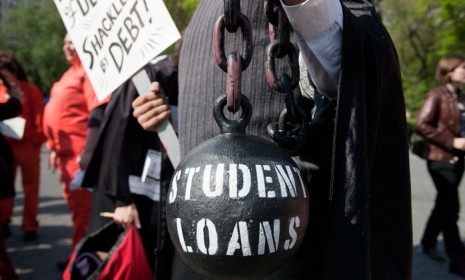Who's to blame for the rising cost of student loans?
As Congress deadlocks over proposals to prevent interest rates from spiking, a look at five possible culprits in America's student-loan mess

A free daily email with the biggest news stories of the day – and the best features from TheWeek.com
You are now subscribed
Your newsletter sign-up was successful
This week, Senate Republicans blocked a measure that would prevent interest rates on government-subsidized student loans from doubling in two months — a move that comes at a time of already-intense anxiety over soaring college costs, which show no signs of stabilizing. Outstanding student debt in America recently reached the $1 trillion mark, surpassing the county's credit card and auto loan debt, and economists say it's becoming a burden on the broader economy. Who's to blame for this mess?
1. Republicans
The GOP says it has no desire to see interest rates on subsidized loans go up, but blocked the bill anyway, apparently to appease conservatives "who are hungry for confrontation with Democrats," says Sahil Kapur at Talking Points Memo. The Senate bill would have been paid for by closing loopholes that allow wealthy taxpayers to avoid Social Security and Medicare taxes, but Republicans, hemmed in by conservative anti-tax groups, say the measure will hurt job creators.
The Week
Escape your echo chamber. Get the facts behind the news, plus analysis from multiple perspectives.

Sign up for The Week's Free Newsletters
From our morning news briefing to a weekly Good News Newsletter, get the best of The Week delivered directly to your inbox.
From our morning news briefing to a weekly Good News Newsletter, get the best of The Week delivered directly to your inbox.
2. Democrats
Liberals claim that they want to prevent an interest-rate hike, but they're guilty of "political posturing" as well, says Marilou Johanek at The Toledo Blade. After all, Republicans in the House approved a bill that would pay for the subsidies with money taken from an ObamaCare preventive health care fund, but the vast majority of Democrats balked.
3. Too much government
Forget interest rates — the real problem is the way the government is involved in the student loan industry in the first place, says Robert Applebaum at The Hill. By guaranteeing loans against default, the government is making "free money" available "to anyone with a pulse who wants to take out a student loan." Colleges and universities "have had no incentive to keep costs down — and they haven't."
A free daily email with the biggest news stories of the day – and the best features from TheWeek.com
4. Too little government
One of the main reasons tuition costs have risen is because cash-strapped state legislatures "are cutting funding for state schools," says Ben Adler at The Nation. And at the federal level, the government could do a much better job of creating incentives for universities to improve affordability and the long-term value of the degrees they offer.
5. Students
Students don't make good "enrollment and borrowing decisions," say Mark Kantrowitz and Mark Schneider at TIME. They're "taking on too much debt" without factoring in whether a more expensive degree will actually help them find a better job in the future. "Financial literacy needs to be taught in secondary schools and colleges specifically to help students make sound education investment decisions."
-
 The Week Unwrapped: Have televised confessions quelled protests in Iran?
The Week Unwrapped: Have televised confessions quelled protests in Iran?Podcast Plus, why has Elon Musk turned from Mars to the Moon? And will the BBC prove to be a puzzles champ?
-
 The week’s best photos
The week’s best photosIn Pictures An Andean god, a rogue squirrel, and more
-
 ‘Zero trimester’ influencers believe a healthy pregnancy is a choice
‘Zero trimester’ influencers believe a healthy pregnancy is a choiceThe Explainer Is prepping during the preconception period the answer for hopeful couples?